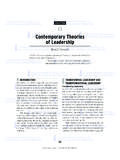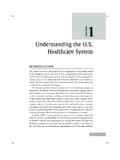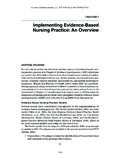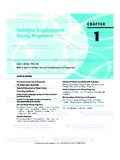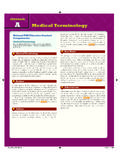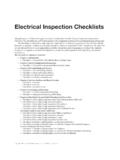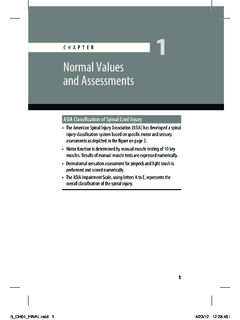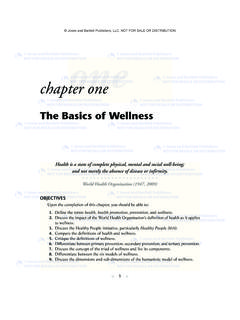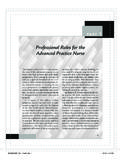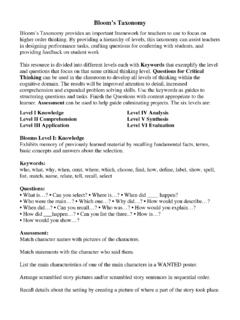Transcription of Introduction to Ethics - Jones & Bartlett Learning
1 Introduction to Ethics In the world today, we are in the throes of a giant ethical leap that is essen-tially embracing all of humankind (Donahue, 1996, p. 484). Scientific andtechnological advances, economic realities, pluralistic worldviews, and globalcommunication make it difficult for nurses to ignore the important ethicalissues in the world community, their everyday lives, and their work. As con-troversial and sensitive ethical issues continue to challenge nurses and otherhealthcare professionals, many professionals have begun to develop an appre-ciation for traditional philosophies of Ethics and the diverse viewpoints ofothers. Ethical directives are not always clearly evident, and people sometimes dis-agree about what is right and wrong. These factors lead some people to believe3 After reading this chapter, the reader should be able the terms ethicsand moralsand discuss philosophical uses ofthese systems of moral reasoning as they have been usedthroughout a variety of ethical theories and approaches to use inpersonal and professional relationships.
2 OBJECTIVESI ntroduction to EthicsKaren L. Rich A seed will only become a flower if it gets sun and water. 11/11/11 11:19 AM Page 3 Jones & Bartlett Learning , LLC. NOT FOR SALE OR DISTRIBUTION. Jones & Bartlett Learning , LLCNOT FOR SALE OR DISTRIBUTION Jones & Bartlett Learning , LLCNOT FOR SALE OR DISTRIBUTION Jones & Bartlett Learning , LLCNOT FOR SALE OR DISTRIBUTION Jones & Bartlett Learning , LLCNOT FOR SALE OR DISTRIBUTION Jones & Bartlett Learning , LLCNOT FOR SALE OR DISTRIBUTION Jones & Bartlett Learning , LLCNOT FOR SALE OR DISTRIBUTION Jones & Bartlett Learning , LLCNOT FOR SALE OR DISTRIBUTION Jones & Bartlett Learning , LLCNOT FOR SALE OR DISTRIBUTION Jones & Bartlett Learning , LLCNOT FOR SALE OR DISTRIBUTION Jones & Bartlett Learning , LLCNOT FOR SALE OR DISTRIBUTION Jones & Bartlett Learning , LLCNOT FOR SALE OR DISTRIBUTION Jones & Bartlett Learning , LLCNOT FOR SALE OR DISTRIBUTION Jones & Bartlett Learning .
3 LLCNOT FOR SALE OR DISTRIBUTION Jones & Bartlett Learning , LLCNOT FOR SALE OR DISTRIBUTION Jones & Bartlett Learning , LLCNOT FOR SALE OR DISTRIBUTION Jones & Bartlett Learning , LLCNOT FOR SALE OR DISTRIBUTION Jones & Bartlett Learning , LLCNOT FOR SALE OR DISTRIBUTION Jones & Bartlett Learning , LLCNOT FOR SALE OR DISTRIBUTION Jones & Bartlett Learning , LLCNOT FOR SALE OR DISTRIBUTION Jones & Bartlett Learning , LLCNOT FOR SALE OR DISTRIBUTION that Ethics can be based merely on personal opinions. However, if nurses are toenter into the global dialogue about Ethics , they must do more than practice ethicsbased simply on their personal opinions, their intuition, or the unexamined beliefsthat are proposed by other people. It is important for nurses to have a basic under-standing of the concepts, principles, approaches, and theories that have been usedin studying Ethics throughout history so that they can identify and analyze ethicalissues and dilemmas that are relevant to nurses in the 21st century.
4 Mature ethicalsensitivities are critical to ethical practice, and as Hope (2004) proposed, we needto develop our hearts as well as our minds (p. 6). The Meaning of Ethics and Morals When narrowly defined according to its original use, Ethics is a branch of philos-ophy that used to study ideal human behavior and ideal ways of being. Theapproaches to Ethics and the meanings of related concepts have varied over timeamong philosophers and ethicists. For example, Aristotle believed that ideal behav-iors were practices that lead to the end goal of eudaimonia, which is synonymouswith a high level of happiness or well-being; on the other hand, Immanuel Kant,an 18th-century philosopher and ethicist, believed that ideal behavior was actingin accordance with one s duty.
5 For Kant, well-being meant having the freedom toexercise autonomy (self-determination), not being used as a means to an end, beingtreated with dignity, and having the capability to think rationally. As a philosophical discipline of study, ethicsis a systematic approach to under-standing, analyzing, and distinguishing matters of right and wrong, good and bad,and admirable and deplorable as they relate to the well-being of and the relation-ships among sentient beings. Ethical determinations are applied through the use offormal theories, approaches, and codes of conduct, such as codes that are devel-oped for professions and religions. Ethics is an active process rather than a staticcondition, so some ethicists use the expression doing Ethics . When people are doingethics, they need to support their beliefs and assertions with sound reasoning; inother words, even if people believe that Ethics is totally subjective, they must be ableto justify their positions through logical, theoretically based arguments.
6 Feelingsand emotions are a normal part of everyday life and can play a legitimate role indoing Ethics . However, people sometimes allow their emotions to overtake goodreasoning, and when this happens, it does not provide a good foundation forethics-related decisions. Evaluations generated through the practice of ethicsrequire a balance of emotion and reason. Throughout history, people, based ontheir culture, have engaged in actions that they believed were justifiable only tohave the light of reason later show otherwise. Following a charismatic, but ego-centric, leader, such as Adolph Hitler, is an example of such a practice. As contrasted with Ethics , moralsare specific beliefs, behaviors, and ways ofbeing derived from doing Ethics . One s morals are judged to be good or bad4 CHAPTER 1: Introduction to 11/11/11 11:19 AM Page 4 Jones & Bartlett Learning , LLC.
7 NOT FOR SALE OR DISTRIBUTION. Jones & Bartlett Learning , LLCNOT FOR SALE OR DISTRIBUTION Jones & Bartlett Learning , LLCNOT FOR SALE OR DISTRIBUTION Jones & Bartlett Learning , LLCNOT FOR SALE OR DISTRIBUTION Jones & Bartlett Learning , LLCNOT FOR SALE OR DISTRIBUTION Jones & Bartlett Learning , LLCNOT FOR SALE OR DISTRIBUTION Jones & Bartlett Learning , LLCNOT FOR SALE OR DISTRIBUTION Jones & Bartlett Learning , LLCNOT FOR SALE OR DISTRIBUTION Jones & Bartlett Learning , LLCNOT FOR SALE OR DISTRIBUTION Jones & Bartlett Learning , LLCNOT FOR SALE OR DISTRIBUTION Jones & Bartlett Learning , LLCNOT FOR SALE OR DISTRIBUTION Jones & Bartlett Learning , LLCNOT FOR SALE OR DISTRIBUTION Jones & Bartlett Learning , LLCNOT FOR SALE OR DISTRIBUTION Jones & Bartlett Learning .
8 LLCNOT FOR SALE OR DISTRIBUTION Jones & Bartlett Learning , LLCNOT FOR SALE OR DISTRIBUTION Jones & Bartlett Learning , LLCNOT FOR SALE OR DISTRIBUTION Jones & Bartlett Learning , LLCNOT FOR SALE OR DISTRIBUTION Jones & Bartlett Learning , LLCNOT FOR SALE OR DISTRIBUTION Jones & Bartlett Learning , LLCNOT FOR SALE OR DISTRIBUTION Jones & Bartlett Learning , LLCNOT FOR SALE OR DISTRIBUTION Jones & Bartlett Learning , LLCNOT FOR SALE OR DISTRIBUTION through systematic ethical analysis. The reverse of morality is immorality, whichmeans that a person s behavior is in opposition to accepted societal, religious, cul-tural, or professional ethical standards and principles; examples of immoralityinclude dishonesty, fraud, murder, and sexually abusive acts. Amoralis a term usedto refer to actions that can normally be judged as moral or immoral, but are donewith a lack of concern for good behavior.
9 For example, murder is immoral, but ifa person commits murder with absolutely no sense of remorse or maybe even asense of pleasure, the person is acting in an amoral way. Acts are considered to benonmoral if moral standards essentially do not apply to the acts; for example,choosing between cereal and toast and jam for breakfast is a nonmoral decision. When people consider matters of Ethics , they usually are considering mattersabout freedom in regard to personal choices, one s obligations to other sentientbeings, or judgments about human character. The term unethicalis used todescribe Ethics in its negative form when, for instance, a person s character orbehavior is contrary to admirable traits or the code of conduct that has beenendorsed by one s society, community, or profession.
10 Because the word ethicsisused when one may actually be referring to a situation of morals, the process-related or doing conception of Ethics is sometimes overlooked today. People oftenuse the word ethicswhen referring to a collection of actual beliefs and behaviors,thereby using the terms Ethics and morals interchangeably. In this book, someeffort has been made to distinguish the words ethicsand moralsbased on their lit-eral meanings; however, because of common uses, the terms have generally beenused (2003) delineated important features regarding the concepts moralsand Ethics :nProbably the most important feature about Ethics and morals is that no onecan avoid making moral or ethical decisions because the social connectionwith others necessitates that people must consider moral and ethicalactions.
